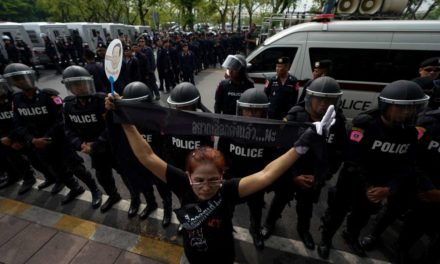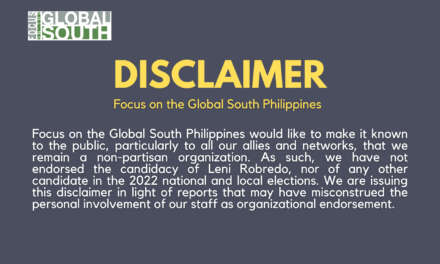Dear Commerce Minister Shri. Arun Jaitley,
We have read on the website of the Confederation of Indian Industries (CII) that “the Commonwealth Business Council (CBC) – a business arm of Commonwealth countries and the Confederation of Indian Industry (CII) are jointly organising the "Commonwealth Trade Summit: Road to Mexico" in partnership with the Ministry of Commerce & Industry, Government of India during 15–16 March, 2003 in Hotel Taj Palace, New Delhi. The other supporting institutions are Department for International Trade, Government of U.K. and London School of Economics. WTO is now engaged in the new round of negotiations called the "Doha Development Round". It has wide-ranging issues under negotiations…Keeping in line with the on-going negotiations, the Trade Summit will address business concerns relating to all issues. The main focus would be on understanding how the 54 Commonwealth Countries can work together in forming a common position on issues of interest. The Summit will be addressed by several Trade Ministers and negotiators from across the Commonwealth countries, besides those from the US and the European Union. We feel it is a very important programme for you where you can express your concerns and contribute your inputs in the negotiation process."
If one is not mistaken, initially, this meeting being organised by the Commonwealth Business Council and the Confederation of Indian Industries (CII) was planned without government participation.
What is in fact agonizing to note the erstwhile Commerce and Industry Minister-in charge, Shri. Arun Shourie (who was then substituting for Mr. Murasoli Maran) elevated this meeting organised by the CII and CBC into an unofficial Mini Ministerial Conference of the WTO by keeping even the concerned bureaucracy and even the Indian Mission at Geneva in dark. Perhaps it could be this irrational exuberance that might have costed Shri. Shourie his permanency as a Commerce Minister.
Although sources from the Commerce Ministry, especially after the departure of Shri. Shourie, have kept on denying their official involvement in this illegitimate process, the presence of the Indian emblem and the language describing the event on the CII website adequately reflects that the Indian Government is supporting the illegitimate and illegal ‘Mini-Ministerial’ process. On inquiring further I have been told that the meeting being organised cannot be ‘Mini-Ministerial’ as the format of the meeting is not so. But given the way illegitimate ‘green room’ processes have been taking place in the history of WTO negotiations, it would not be too irrational to expect Zoellick and Lamy (who are expected to be in Delhi to give luncheon speeches for this meeting) using this opportunity to hold unofficial ‘Mini Ministerial’ meetings inventing some different formats that suit their interests. Not to mention the news of their arrival in Delhi would naturally attract senior officials from Commonwealth Capitals thereby elevating the political importance of this meeting.
Seeing this I am wondering whether the Government of India along with business and other handful of countries is actually trying to construct new undemocratic and illegitimate ways of decisionmaking that are even more non-transparent than ‘green rooms’ and ‘Mini-Ministerials’.
Please note that I am not the only one to be upset with the idea of India being an “official host” to such a meeting. A number of peoples movement, trade unions, NGOs, consumer organizations all over the world are quite shocked with the Indian Governments decision, especially given the historical approach of the Government towards issues pertaining to democracy and sovereignty in international decisionmaking.
I am aware that the bureaucracy in the Ministry must have already briefed you on why these ‘Mini Ministerials’ are dangerous. But at the cost of repetition I would like to state that these meetings are fundamentally flawed as:
1) The criteria of countries selected for the ‘Mini Ministerial’ is unknown;
2) No written record is kept of the discussions at such meetings;
3) Decisions are made that affect the entire membership and the agenda is set on their behalf and in their absence; and
4) An attempt is made to build ‘consensus’ on critical WTO negotiations by a select group, which de facto and illegally takes leadership of the organisation.
But besides these issues, it is very undignified and unjust for a Ministry of a democratically elected government to consult only the ‘Big Business’ who are hardly representative of Indian masses and then arrive at a decision to be a host to a process, especially one that is as strategic as a ‘Mini Ministerial’ that is going to impact the lives of millions.
The other question is whether the Indian Government even consulted all the political parties and other interest groups before taking a decision to tacitly or outrightly supporting such an illegitimate process. Although the Government might try to legitimize its stand by arguing that by not hosting a Mini Ministerial it would lose out in the end, it cannot dodge the issue of not consulting all the stake holders before arriving at such an important and strategic decision.
Many others and I feel that the holding of such illegitimate and unofficial ‘Mini-Ministerials’ and ‘Green Room’ meetings should not be accepted by us and by a government that is elected by us. This process violates the spirit of international cooperation and undermines democratic principles for an international institution that creates legally binding and enforceable agreements for 145 governments worldwide.
The historical record of the WTO shows that before the WTO Ministerial meetings in Singapore (1996), Seattle (1999) and Doha (2001), Mini-Ministerials were held to promote the goals of the major developed countries. The same process is now taking place on the road to Cancun. The major powers in the WTO regularly make use of such ‘Mini-Ministerials’ to pressure developing countries to accept their positions, which have been contrary to the interests of development. Such meetings substantiate the endemic problems of transparency that have plagued the WTO since its inception in 1995.
As you might be aware, Doha Ministerial process represented raw power politics and a non-transparent and non-inclusive mechanism of consensus building. The two Mini-Ministerials held before Doha continued in the form of ‘Green Room’ meetings in Doha with the same configuration of 23 or so countries. After an unauthorised extension of the Ministerial and a final all-night marathon, the final package was presented to the other Delegations in the absence of many of their Ministers, who were unable to accommodate the unexpected extension of the Ministerial meeting. The illegitimate process in Doha, and the active role of a biased WTO Secretariat led to a Declaration, which now endorses the possibility of launching new negotiations in investment, competition and government procurement at the Fifth Ministerial. This method of expanding the WTO agenda is unacceptable, yet it seems that this is again being used in the run-up to Cancun.
WTO agreements oblige governments to undertake serious legislative and regulatory reforms that impact domestic policies not just limited to trade. The agreements have significant political, social and economic consequences. It is in this context that we condemn these illegitimate secretive meetings that have also faced wrath of the people when they were organized even in the remotest places in Australia and in Japan.
In this context it would be wise for the Government to:
1) Restrain from being a host to such illegitimate processes that would compromise the interests of millions for the benefit of ‘Big Business’.
2) Publicly come out and say that it would not be endorsing any such Mini Ministerials.
3) Reject ‘exclusive’ Mini-Ministerial and Green Room meetings where only a select group of WTO Members are invited to discuss the WTO agenda behind closed doors.
4) Hold Public Consultations before coming to decision on any critical WTO issues, especially in the context of liberalization of investment, services and competition regimes.
We have read on the website of the Confederation of Indian Industries (CII) that “the Commonwealth Business Council (CBC) – a business arm of Commonwealth countries and the Confederation of Indian Industry (CII) are jointly organising the "Commonwealth Trade Summit: Road to Mexico" in partnership with the Ministry of Commerce & Industry, Government of India during 15–16 March, 2003 in Hotel Taj Palace, New Delhi. The other supporting institutions are Department for International Trade, Government of U.K. and London School of Economics. WTO is now engaged in the new round of negotiations called the "Doha Development Round". It has wide-ranging issues under negotiations…Keeping in line with the on-going negotiations, the Trade Summit will address business concerns relating to all issues. The main focus would be on understanding how the 54 Commonwealth Countries can work together in forming a common position on issues of interest. The Summit will be addressed by several Trade Ministers and negotiators from across the Commonwealth countries, besides those from the US and the European Union. We feel it is a very important programme for you where you can express your concerns and contribute your inputs in the negotiation process."
If one is not mistaken, initially, this meeting being organised by the Commonwealth Business Council and the Confederation of Indian Industries (CII) was planned without government participation.
What is in fact agonizing to note the erstwhile Commerce and Industry Minister-in charge, Shri. Arun Shourie (who was then substituting for Mr. Murasoli Maran) elevated this meeting organised by the CII and CBC into an unofficial Mini Ministerial Conference of the WTO by keeping even the concerned bureaucracy and even the Indian Mission at Geneva in dark. Perhaps it could be this irrational exuberance that might have costed Shri. Shourie his permanency as a Commerce Minister.
Although sources from the Commerce Ministry, especially after the departure of Shri. Shourie, have kept on denying their official involvement in this illegitimate process, the presence of the Indian emblem and the language describing the event on the CII website adequately reflects that the Indian Government is supporting the illegitimate and illegal ‘Mini-Ministerial’ process. On inquiring further I have been told that the meeting being organised cannot be ‘Mini-Ministerial’ as the format of the meeting is not so. But given the way illegitimate ‘green room’ processes have been taking place in the history of WTO negotiations, it would not be too irrational to expect Zoellick and Lamy (who are expected to be in Delhi to give luncheon speeches for this meeting) using this opportunity to hold unofficial ‘Mini Ministerial’ meetings inventing some different formats that suit their interests. Not to mention the news of their arrival in Delhi would naturally attract senior officials from Commonwealth Capitals thereby elevating the political importance of this meeting.
Seeing this I am wondering whether the Government of India along with business and other handful of countries is actually trying to construct new undemocratic and illegitimate ways of decisionmaking that are even more non-transparent than ‘green rooms’ and ‘Mini-Ministerials’.
Please note that I am not the only one to be upset with the idea of India being an “official host” to such a meeting. A number of peoples movement, trade unions, NGOs, consumer organizations all over the world are quite shocked with the Indian Governments decision, especially given the historical approach of the Government towards issues pertaining to democracy and sovereignty in international decisionmaking.
I am aware that the bureaucracy in the Ministry must have already briefed you on why these ‘Mini Ministerials’ are dangerous. But at the cost of repetition I would like to state that these meetings are fundamentally flawed as:
1) The criteria of countries selected for the ‘Mini Ministerial’ is unknown;
2) No written record is kept of the discussions at such meetings;
3) Decisions are made that affect the entire membership and the agenda is set on their behalf and in their absence; and
4) An attempt is made to build ‘consensus’ on critical WTO negotiations by a select group, which de facto and illegally takes leadership of the organisation.
But besides these issues, it is very undignified and unjust for a Ministry of a democratically elected government to consult only the ‘Big Business’ who are hardly representative of Indian masses and then arrive at a decision to be a host to a process, especially one that is as strategic as a ‘Mini Ministerial’ that is going to impact the lives of millions.
The other question is whether the Indian Government even consulted all the political parties and other interest groups before taking a decision to tacitly or outrightly supporting such an illegitimate process. Although the Government might try to legitimize its stand by arguing that by not hosting a Mini Ministerial it would lose out in the end, it cannot dodge the issue of not consulting all the stake holders before arriving at such an important and strategic decision.
Many others and I feel that the holding of such illegitimate and unofficial ‘Mini-Ministerials’ and ‘Green Room’ meetings should not be accepted by us and by a government that is elected by us. This process violates the spirit of international cooperation and undermines democratic principles for an international institution that creates legally binding and enforceable agreements for 145 governments worldwide.
The historical record of the WTO shows that before the WTO Ministerial meetings in Singapore (1996), Seattle (1999) and Doha (2001), Mini-Ministerials were held to promote the goals of the major developed countries. The same process is now taking place on the road to Cancun. The major powers in the WTO regularly make use of such ‘Mini-Ministerials’ to pressure developing countries to accept their positions, which have been contrary to the interests of development. Such meetings substantiate the endemic problems of transparency that have plagued the WTO since its inception in 1995.
As you might be aware, Doha Ministerial process represented raw power politics and a non-transparent and non-inclusive mechanism of consensus building. The two Mini-Ministerials held before Doha continued in the form of ‘Green Room’ meetings in Doha with the same configuration of 23 or so countries. After an unauthorised extension of the Ministerial and a final all-night marathon, the final package was presented to the other Delegations in the absence of many of their Ministers, who were unable to accommodate the unexpected extension of the Ministerial meeting. The illegitimate process in Doha, and the active role of a biased WTO Secretariat led to a Declaration, which now endorses the possibility of launching new negotiations in investment, competition and government procurement at the Fifth Ministerial. This method of expanding the WTO agenda is unacceptable, yet it seems that this is again being used in the run-up to Cancun.
WTO agreements oblige governments to undertake serious legislative and regulatory reforms that impact domestic policies not just limited to trade. The agreements have significant political, social and economic consequences. It is in this context that we condemn these illegitimate secretive meetings that have also faced wrath of the people when they were organized even in the remotest places in Australia and in Japan.
In this context it would be wise for the Government to:
1) Restrain from being a host to such illegitimate processes that would compromise the interests of millions for the benefit of ‘Big Business’.
2) Publicly come out and say that it would not be endorsing any such Mini Ministerials.
3) Reject ‘exclusive’ Mini-Ministerial and Green Room meetings where only a select group of WTO Members are invited to discuss the WTO agenda behind closed doors.
4) Hold Public Consultations before coming to decision on any critical WTO issues, especially in the context of liberalization of investment, services and competition regimes.
Raghav Narsalay
Focus on the Global South-India Programme








